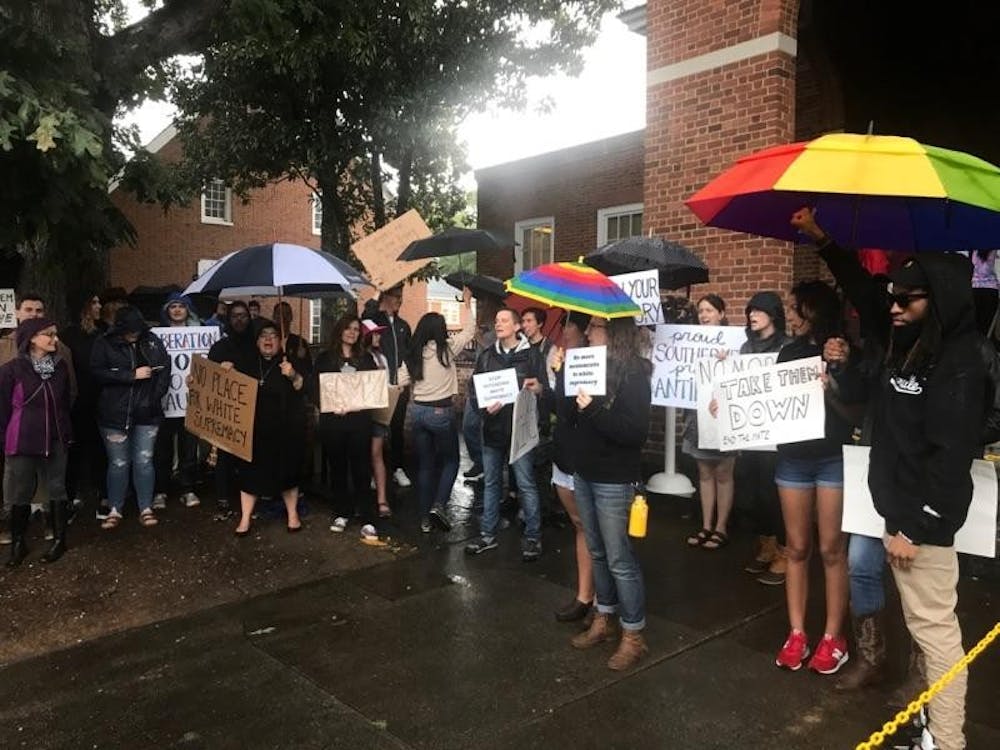The Charlottesville Circuit Court held a second hearing Friday in a lawsuit against the City of Charlottesville concerning the planned removal of the Robert E. Lee from Emancipation Park. Judge Richard E. Moore decided to postpone a ruling on whether the city can legally remove the statue from the park.
Despite not deciding on the removal of the statue, Moore ruled in favor of the renaming of what was formerly known as Lee Park to Emancipation Park
Before the hearing began, community members and demonstrators from Showing Up for Racial Justice and Black Lives Matter stood in the rain outside the courthouse holding signs reading “Stop Defending White Supremacy” and “Take Them Down for Love” in reference to the Lee statue. Many demonstrators also attended the hearing afterward.
The statue of Lee has been the subject of much debate since the Council’s controversial Feb. 6 decision to remove it from Emancipation Park, and one of the stated goals of the Aug. 12 “Unite the Right” rally was to preserve it.
The lawsuit was originally filed last March by the Monument Fund, Inc., the Virginia Division of Sons of Confederate Veterans, Inc. and 11 other individuals against the city and members of the Charlottesville City Council.
The first hearing of the lawsuit held May 2 resulted in the issuance of an injunction by Moore, barring the City from taking any further action in the removal the statue for six months. At the request of the plaintiff, Moore agreed to consider the possibility of extending the current injunction on the removal of the Lee statue Wednesday following the City Council meeting set for Tuesday evening.
In addition, Moore said he would consider imposing an injunction on the removal of a statue of Confederate Gen. Thomas “Stonewall” Jackson from Justice Park in light of a resolution that will be considered by city councilors Tuesday evening that would remove and relocate the statue.
When Moore began Friday’s hearing, he said it was important to allow the public to attend the legal proceedings and cited the amount of public interest in the case.
“Many judges do not normally address members of the public and for good reason,” Moore said. “Though there is obviously a lot of public interest in this case, and the public is entitled to understand the details of these proceedings.”
However, Moore said he lamented the flood of emails, letters and phone calls into the Court’s office denouncing the lawsuit, claiming it could have a potential negative impact upon the proceedings. He also noted the breakdown of a City Council meeting on Aug. 21 when attendees halted the regular meeting and voiced their frustrations on the city’s management of the “Unite the Right” rally.
“I am aware of the events at the Aug. 21 Council meeting,” Moore said. “We are a community here, but this is a court of law, and we will maintain order at today’s proceedings.”
During the hearing, which lasted nearly three hours in all, Moore listened to each side’s arguments over the legality of the City Council’s decision to remove the Lee statue.
The defendants — represented by Chief Deputy City Attorney Lisa Robertson — argued that a 1997 law is not retroactive or does not apply to memorials or monuments constructed before that year.
The 1997 law — section 15.2-1812 of the state code — prohibits localities from disturbing or interfering with war memorials, although Robertson questioned the retroactivity of the legislation.
“The 1997 General Assembly was aware of their intent,” Robertson said. “They would have included a provision to specifically restrict cities and towns [from removing monuments] … Using very specific words.”
The plaintiffs in the suit — represented by attorney Ralph Main — argued the City Council’s Feb. 6 decision to remove the Lee statue constitutes an abuse of power and violates the 1997 state law.
In his closing statement, Main claimed that removing monuments and memorials for war veterans from parks — particularly the Lee statue — affects the rights of individuals to enjoy those public spaces.
Robertson said she questioned whether the Lee statue could even be legally considered a memorial to a war veteran due to an absence of any text dedicated to Lee on the monument.
“The City’s position is that you can’t infer that the [Lee] statue is a memorial to a war veteran without an inscription of some kind,” Robertson said.
Before the hearing adjourned, Moore said he was uncertain as to how he would ultimately rule on the case.
“I really don’t know how I’m going to rule on this,” Moore said. “There are legitimate merits on both sides.”







